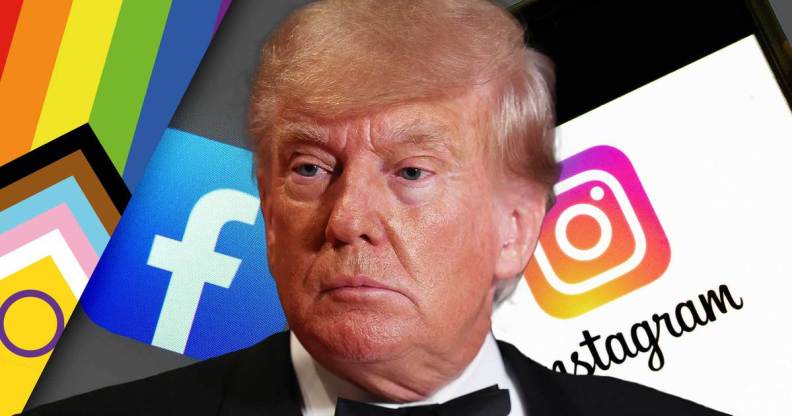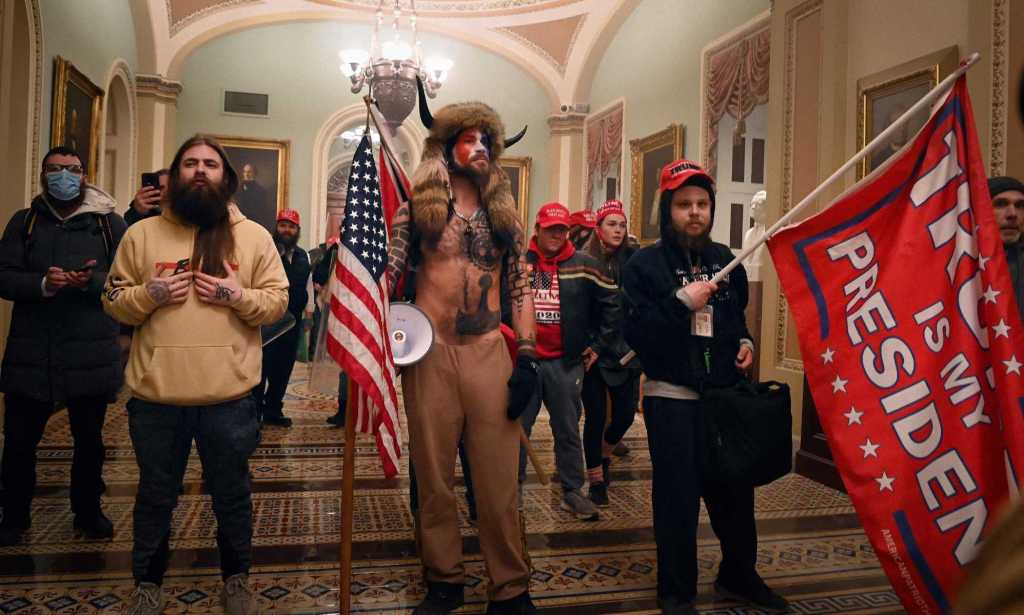Donald Trump’s Facebook ban lifted. What does it mean for LGBTQ+ people?

Donald Trump is heading back to Facebook and Instagram soon. (Getty Images)
Donald Trump will return to Facebook and Instagram following a two-year suspension from the platforms, Meta has announced.
In a blog post, Meta’s president of global affairs, Nick Clegg, said the ban would be lifted in “coming weeks” and Trump will be subject to “new guardrails” which aim to deter him from breaking rules on the platforms.
While active on social media, and during his time as President of the United States, Trump shared racist, sexist, antisemetic and queerphobic content and language, and spread disinformation about important issues.
This is not the first time a banned social media account has been returned to him.
Back on 20 November 2022, Elon Musk announced Trump would have his Twitter account reinstated, meaning that once his Meta accounts are unblocked he will have access to his pre-Capitol riot social media following once more.
Ahead of his return to Facebook and Instagram, Trump has been photographed meeting with Chaya Raichik, founder of Libs Of TikTok, which has been implicated in bomb threats at US hospitals, and regularly shares anti-LGBTQ+ content.
The controversial then-US president was banned from the Meta social media sites on 7 January 2021 after he praised people who were involved in the attack on the United States Capitol Building a day prior.
Meta’s decision to suspend him was taken under “extreme and highly unusual circumstances” and was described by Clegg as an “extraordinary decision taken in extraordinary circumstances”.
“The normal state of affairs is that the public should be able to hear from a former president of the United States, and a declared candidate for that office again, on our platforms,” he continued.
“Now that the time period of the suspension has elapsed, the question is not whether we choose to reinstate Mr Trump’s accounts, but whether there remain such extraordinary circumstances that extending the suspension beyond the original two-year period is justified.”
Following his defeat to Democrat Joe Biden in the 2020 presidential election, a group of Trump supporters attacked the Capitol Building in Washington, on January 6, 2021.
Several people were killed, hundreds injured and nearly 1,000 people have been charged in relation to the day’s events.
Four police officers who responded to the violence have subsequently taken their lives.

“Like any other Facebook or Instagram user, Mr Trump is subject to our Community Standards,” Clegg said in the blog post.
“In light of his violations, he now also faces heightened penalties for repeat offences, penalties which will apply to other public figures whose accounts are reinstated from suspensions related to civil unrest under our updated protocol.
“In the event that Mr Trump posts further violating content, the content will be removed and he will be suspended for between one month and two years, depending on the severity of the violation.”
The events of 6 January were not the first time Trump’s use of social media was called into question.
Prior to banning, Trump was repeatedly flagged by various platforms for violating hate speech and discrimination policies, causing controversy with his racist, sexist, antisemetic and queerphobic language, as well as sharing false information about various divisive topics.
This included, but was certainly not limited to: asserting Barack Obama was not US citizen, sharing white supremacist videos targeting Muslims, encouraging violence against Black Lives Matter protesters, stoking international tensions by threatening North Korea, exaggerated figures about illegal immigration and sharing misinformation about COVID-19.
Amongst his social media noise, the Trump administration made numerous attacks on the rights of LGBTQ+ people.
In 2017, a trio of tweets from the president announced a ban transgender people serving in the US military because of the “tremendous medical costs and disruption” – however many pointed out the medical costs cited by Trump less than 10 percent of what the military paid out each year to treat erectile dysfunction.
He opposed the Equality Act – which offer protects to LGBTQ+ people, sought to block job protections for gay people, and wiped out anti-discrimination protections from healthcare, as well as joking about vice president Mike Pence wanting to “hang” gay people.
What will happen next?
PinkNews has long reported on Trump’s anti-LGBTQ+ moves while he was campaigning, in power and in the aftermath of his presidency.
It is undeniable that his trigger-quick response to the hot-button issues of the day – often without thought for the long-ranging repercussions – poses a threat to LGBTQ+ people.
In 2023, as Trump is set to return to mainstream social media, there are record numbers of anti-LGBTQ+ bills being debated in states across America, transphobic fear-mongering in the media is rife and minority voices on social media platforms are being censored.
Trump’s social media posts have historically lacked any form of evidence and, as more and more untruths fly around about LGBTQ+ people, the community is at risk of being further demonised by one of the most followed men on the planet.
With Trump’s intention to run for president in 2024 underway, there is no doubt his social media will focus on many people’s attention in the coming months. What form this takes, and how LGBTQ+ people will be impacted, will become apparent inevitably soon.
How have people reacted to the news?
Responding to Meta’s decision, Michael Kleinman, Amnesty International USA’s senior director of technology and human rights, told PinkNews: “During the Capitol riots, Donald Trump used his social media platforms to escalate violence.
“Under the UN Guiding Principles on Business and Human Rights, all companies have a responsibility to respect human rights.
“Yet Facebook and Instagram’s business model incentivises the company to boost harmful and inflammatory content that fuels violence and human rights violations.
“Meta must commit sufficient resources to ensure effective and impartial moderation in line with international human rights standards. Trump must be held to the same standards as everyone else.
“Social media companies, including Meta, cannot allow the advocacy of hatred and incitement of discriminatory violence to flourish on their platforms.”
Civil rights activist and academic Professor Kimberlé Crenshaw was quick to comment on Trump’s return to Meta platforms.
On Twitter, she wrote: “Donald Trump leveraged social media and racism to try to overthrow the government. He now has access to every platform.
“Meanwhile, diverse writers across the country are seeing their works banned in schools and libraries for expressing anti-racist ideas. This is America in 2023.”
Californian Democratic congressman Adam Schiff called the move by Meta “dangerous”.
“Trump incited an insurrection. And tried to stop the peaceful transfer of power. He’s shown no remorse. No contrition. Giving him back access to a social media platform to spread his lies and demagoguery is dangerous.
“@facebook caved, giving him a platform to do more harm,” he wrote on Twitter.
Victor Shi, a writer, speaker and activist, took a similar stance.
He said: “BREAKING: Facebook AND Instagram are reinstating Trump on the platforms. A man who incited a violent mob to the U.S. Capitol & who continues to spread lies & endanger democracy to his millions of followers should be permanently banned. What a terrible decision. Shame on Meta.”
How did this story make you feel?

